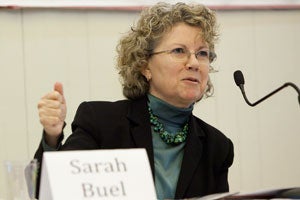Advocacy and litigation on behalf of women’s interests has expanded the rights and protections available to women, according to a group of panelists assembled for a recent women’s law conference, “Women for Women: Advocating for Change,” hosted by the HLS Women’s Law Association at Harvard Law on Feb. 19.
In a panel discussion “Change in the Courtroom,” a group of HLS alumnae and practicing attorneys discussed both the advantages and challenges of arguing for women’s rights from within the legal system.
Panelists included: Sarah Buel ’90, clinical professor at the University of Texas School of Law and cofounder of the school’s Institute on Domestic Violence and Sexual Assault; Nancy Duff Campbell, founder and co-president of the National Women’s Law Center; Peggy Kuo ’88, chief hearing officer at the New York Stock Exchange and former trial attorney with the United Nations International Criminal Tribunal for the former Yugoslavia; and Lenora Lapidus ‘90, Director of the Women’s Rights Project at the American Civil Liberties Union.
View a video of the panel discussion.
The panelists responded to a wide range of questions, including the benefits and limitations of using litigation to address women’s rights issues, the importance of mentorship, what the ongoing and upcoming issues in women’s rights are, and what advice they would give to new attorneys interested in women’s rights issues.
Regarding the advantages and disadvantages of litigation as a tool for obtaining rights for women, all of the panelists agreed that there are times when court action is appropriate and times when it isn’t. Campbell described litigation as “an amazingly powerful tool,” that can add legitimacy to rights claims because it appeals to already existing law, but also pointed out that, as such, litigation is often limited by the nature of that law.
Lapidus agreed about the effectiveness of lawsuits, and also emphasized the importance of using new forms of media – such as YouTube – to “change the dialogue” about the issues being litigated. Buel also noted that “litigation, even when you’re going to lose, is a powerful tool,” but reminded lawyers considering litigation to consider “What is my ultimate goal and is litigation going to get me there?” before filing a case.
In response to the question on mentorship, Kuo explained that there are two types of mentors – advisors and advocates – and that young lawyers need both to be successful. She also encouraged the audience to actively seek out mentors. “Most people are very willing – even if they’re strangers – to give you ten minutes of their time,” she said.
Both Buel and Campbell emphasized the importance of finding some mentors who are from different walks of life as well, to provide exposure to a wider variety of career options. In addition, Buel told the audience “probably some of my most supportive mentors have been men.”
The panelists highlighted the economic empowerment of women and the increased use of international human rights standards in the American legal system as the “next big issues” in women’s rights law.
As for advice for new lawyers? “Be the best that you can be,” said Campbell, pointing out that in public service, just as in the private sector, employers are looking for the best and brightest candidates.
“Don’t take anything personally,” advised Buel. “Find work that brings you joy… and stick with it.”
Along those same lines, Kuo advised students to “do what you love, because the doors will open magically.” She also emphasized the importance of living frugally, to avoid being limited by the need to make money.
Lapidus suggested that planning one’s career too far in advance could be limiting, and said that new attorneys should, instead, “do what, at the moment, feels exciting and right.”
